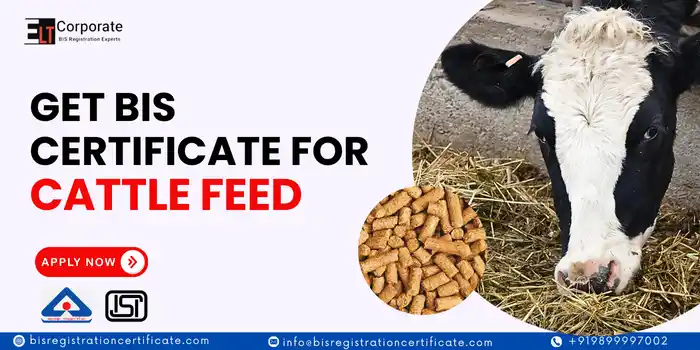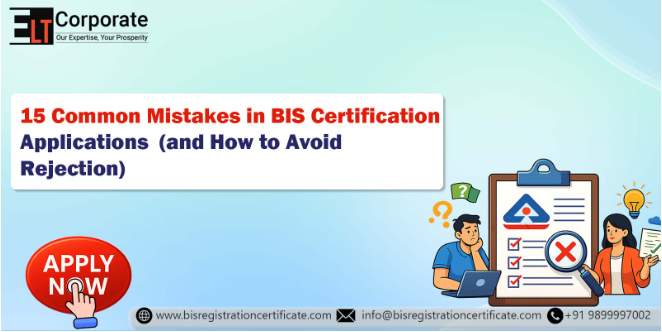One of the world’s largest livestock population in India, and cattle feed plays an important role in ensuring animal health, productivity and food security. To maintain quality standards and protect farmers and consumers, the Bureau of Indian Standards (BIS) has made BIS certification compulsory for cattle feed.
This guide explains what BIS certification is, why is it needed, the process of achieving it, and its benefits for cattle feed manufacturers and importers.
What is BIS Certification
BIS Certification represents a conformity assessment scheme which the Bureau of Indian Standards operates as India’s national standards body. The system verifies that products meet Indian Standards to guarantee safety, along with performance and quality.
BIS certification status as mandatory or voluntary depends on the product category, along with any government-issued Quality Control Orders (QCOs). The certification process for hair oils remains a voluntary practice, yet it stands as highly recommended.
Read More: Introduction To Bureau Of Indian Standards
Key Benefits of Getting BIS Certification for Cattle Feed in India
Below we mentioned benefits of BIS certification for cattle feed
- Regulatory Compliance: Legal requirement under Indian Standards.
- Better market access: ISI mark increases the acceptability of the product among buyers.
- Enhanced Reliability: Ensures confidence in industrial and food-grade applications.
- Export Competitiveness: Supports global recognition of Indian made products.
- Rejections and complaints reduced: Quality consistency reduces customer problems.
Documents Required for BIS Certification for Cattle Feed
Here are some important documents required to obtain BIS Certificate for cattle feed in India:
- Name & Address Proof: Proof of the office and factory premises.
- MSME/SSI Certificate: If applicable.
- Manufacturing Procedure Flow: Detailed documentation covering all manufacturing processes from raw material to finished product.
- Establishment Documents: Incorporation Certificate, Registration Certificate, or Memorandum of Association.
- Outsourcing Information: Details of any outsourced manufacturing operations, if applicable.
- Testing Facilities List: Comprehensive list of testing facilities and machinery used.
- Calibration Certificates: Valid certificates for testing equipment.
- Manufacturing Equipment List: Details and specifications of manufacturing equipment.
- Third-Party Lab Test Report: Product test report from a recognized lab according to Indian Standards, if applicable.
- Factory Layout Plan: Layout plan of factory premises and location plan.
- Authorization Letter: From the CEO if the authorized signatory signs the application form.
- In-House/Independent Test Report: If available.
- Foreign Manufacturing Details: Nomination details of the Indian agent and the nomination form, if manufacturing is overseas.
What Are The Testing Requirements For BIS Certification Of Cattle Feed?
The following tests are required as per the standard to get BIS certificate for cattle feed in India:
- Testing of ingredients
- Testing for chemical composition of ingredients
- Estimation of vitamin D3 and E levels
- Estimation of aflatoxin B1 levels
Remember, the tests will be conducted in a well-maintained lab according to standard methods. Apart from this, compound feed bags must be labelled with the required information and packaged according to IS 2052:2009, including the ISI certification mark. Manufacturers need a BIS license from the Bureau of Indian Standards, which is granted after evaluating the production process, quality control, testing methods, and manufacturing setup.
Step-by-Step Process to Get BIS Certification for Cattle Feed
To obtain a BIS certificate for cattle feed, follow these steps:
- Application Filing: Submit your application to the Bureau of Indian Standards.
- Document Scrutiny: BIS verifies all your paperwork.
- Product Testing: Samples go to BIS-approved labs for IS 2052:2009 testing.
- Factory Audit: Inspectors visit your premises to assess production capabilities.
- Grant of License: If everything meets the cattle feed requirements, you get the ISI Mark for the cattle feed license.
Read More: Process for getting BIS for Certification
Is BIS Mandatory For Cattle Feed?
Yes, obtaining BIS certification for Cattle Feed is mandatory as per 2052:2019 for animal feed in 2009. This standard requires that all commercial cattle feed and feed materials must meet the specified BIS criteria.
Which License Is Required For Cattle Feed In India?
FSSAI license is required for Cattle Feed in India. In India, the primary license required for manufacturing and selling cattle feed is the Feed Manufacturing License. This license is issued by the Food Safety and Standards Authority of India (FSSAI).
Conclusion
Securing BIS certification for cattle feed in India is not just a regulatory requirments-it’s a mark of quality trust, and compliance. With the increasing focus on livestock health and food safety, manufacturers must meet the IS 2052:2009 standards to legally produce and sell cattle feed. From proper documentation and lab testing to factory inspections, every step ensures your product is safe, effective, and market-ready. If you’re planning to enter or expand in the cattle feed business, getting BIS certified is the first step toward long-term success and customer confidence.
Is BIS certification mandatory for cattle feed in India?
Yes, BIS certification is mandatory under IS 2052:2009 for manufacturing and selling commercial cattle feed in India.
What is the purpose of BIS certification for cattle feed?
It ensures the feed meets safety and quality standards, protecting both livestock health and end-consumer interests.
How long does it take to get BIS certification for cattle feed?
The BIS certification process typically takes 30–45 working days, depending on documentation and factory readiness.









